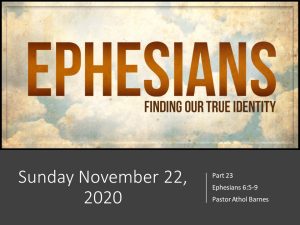
Do you know who you are?
Recently as we visited South Africa, Debbie and I were reminded of the challenge we face around identity. We haven’t lived in South Africa for twenty-two years, but even then, as white English-speaking south Africans, we face an identity crisis. We are of European heritage; the vast majority of South Africans are not. We were very much tourists in our own place of birth.
We came home to Kansas City, and every time we open our mouths, people ask, “where are you from?” We will never be completely American; no matter how much sweet tea and Barbeque we enjoy.
But there is a blessing in my identity struggle. My true identity is found in being a child of God. I belong in the kingdom of God, I am an adopted child of the Living God.
Where is your identity? Do you identify as a follower of Jesus first and then as an American? Whatever your nationality, do you identify as a child of God first?
Do you know your identity? Are you living out your identity?
John begins these verses with his customary greeting, “little children”, he wants the best for them and continues in verse 28 to encourage them to abide in Christ.
Abiding is the theme of the previous section and as we have seen, it means to be rooted in Christ and to remain steadfast and unwavering (see 1 John 2:24). By abiding in Christ John knows that his readers will be protected against false teachers.
There are two blessings in abiding.
1. In abiding there is confidence that there will be no shame when Christs return (1 John 2:28).
Jesus is coming again. When Jesus returns, will you be confident? Or will you be ashamed?
Will you run towards him with excitement or will you be ashamed. Will you draw back because you have some unfinished business to care of, something you need to try and make right?
Are you confident that you are making the most of your time, your gifts and your resources for the Kingdom of God?
If not, today is the day for you to start living exclusively under the Lordship of Jesus Christ, allowing him to lead you to be everything he designed you to be for his glory.
2. In abiding there is certainty of identity (1 John 2:29).
Verse 29 says, “If you know that he is righteous, you may be sure that everyone who practices righteousness has been born of him.”
Practicing righteousness is the fruit of abiding in Christ. Like a tree that feeds on good soil produces good fruit, so to a Christian that feeds on the good soil of God’s Word, prayer, and healthy fellowship will produce good fruit.
However, some Christians are trying to produce good fruit, while at the same time they are feeding on bad nutrients like social media, R-rated movies, gossip, pornography, and the likes. If you are feeding on unhealthy nutrients, you will not be able to practice righteousness.
What are you feeding on?
John begins the 3rd chapter with a wonderful declaration of the identity of followers of Jesus. “See what great love the Father has lavished on us, that we should be called children of God! And that is what we are! The reason the world does not know us is that it did not know him” 1 John 3:1 NIV.
John writes a word picture of unconditional, abundant, outpouring of unlimited love. Not because we deserve it, but because he desired to pour out his love on us.
He poured out His love by sending His only son to die for us to reconcile us to Himself.
More than reconciliation, we are called His children. When we make Jesus Lord of our lives, God the Father adopts us into His family. In the Roman Empire adoption was forever and secure. What a beautiful promise for us.
Children of God should act like Children of God (v29 and v3).
But we know from Ephesians 2:8-9 that we cannot earn our salvation,
Sadly, in the modern church we have become so clear on the doctrine of salvation by grace, that we seem to have forgotten that we need to live out and work out the righteousness that God calls us to.
And the end result is that we have a church of passivity. A stagnant form of Christianity that many drift away from because it wasn’t a Christianity to begin with. There was no abiding and as a result, there was no fruit.
The church today loves the doctrine of being saved by grace in Ephesians 2:8-9. But we must continue on to verse 10 which says, “For we are his workmanship, created in Christ Jesus for good works, which God prepared beforehand, that we should walk in them.”
There is very definitely work in the Christian life. We are not saved by works, rather we are blessed to be able to be used by God for His glory.
Looking at verse 2, we see another reminder of our identity, “Beloved, we are God’s children now, and what we will be has not yet appeared; but we know that when he appears we shall be like him, because we shall see him as he is.”
The DNA that is found in the smallest baby at conception, has all the information to develop that life into a fully grown person.
As followers of Jesus, we also have an eternal DNA. And yet, while we live here on the earth, we display aspects of the nature of God in this world. Are you displaying your Heavenly Fathers Character?
Have you been born again?
Are you living like a child of God?



